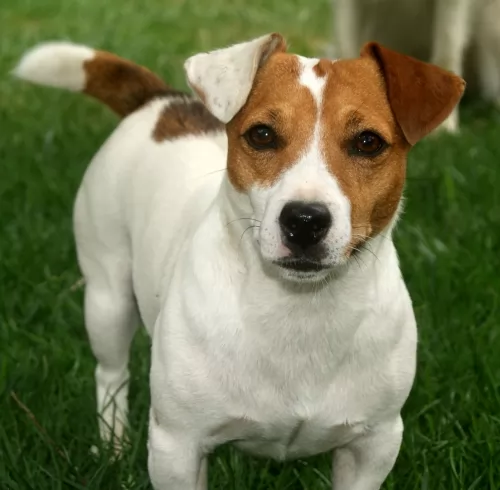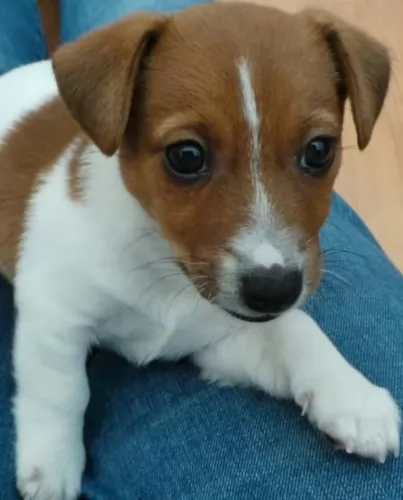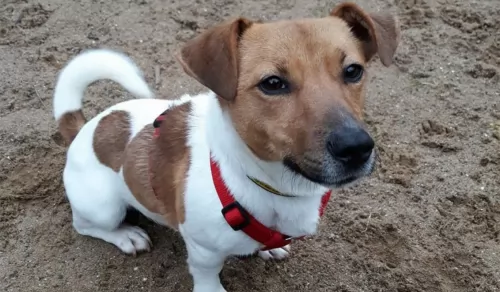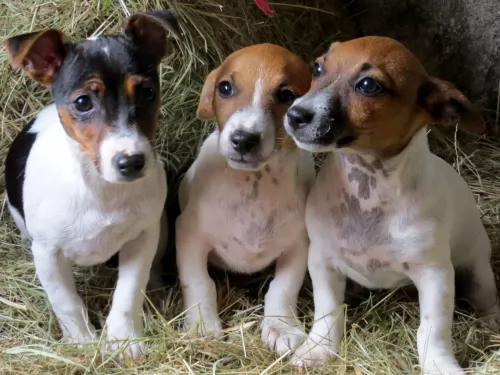 Petzlover
Petzlover Irish Jack Russell is originated from United States but Samoyed is originated from Russia. Irish Jack Russell may grow 25 cm / 9 inches shorter than Samoyed. Irish Jack Russell may weigh 22 kg / 48 pounds lesser than Samoyed. Both Irish Jack Russell and Samoyed has almost same life span. Both Irish Jack Russell and Samoyed has same litter size. Irish Jack Russell requires Low Maintenance. But Samoyed requires Moderate Maintenance
Irish Jack Russell is originated from United States but Samoyed is originated from Russia. Irish Jack Russell may grow 25 cm / 9 inches shorter than Samoyed. Irish Jack Russell may weigh 22 kg / 48 pounds lesser than Samoyed. Both Irish Jack Russell and Samoyed has almost same life span. Both Irish Jack Russell and Samoyed has same litter size. Irish Jack Russell requires Low Maintenance. But Samoyed requires Moderate Maintenance
 Originating in the United States of America, the Irish Jack Russell, also known as Short Jack Russells, was bred to bring about a calmer temperament and to also have a dog with shorter legs.
Originating in the United States of America, the Irish Jack Russell, also known as Short Jack Russells, was bred to bring about a calmer temperament and to also have a dog with shorter legs.
Always a working dog, breeders of the Irish Jack Russell wanted to create a dog with less of a hunting instinct in him and have a dog which would be more companionable.
These Irish Jack Russells look much like your regular Jack Russell but are more of a companion dog than a hunting dog. The Irish Jack Russell doesn’t adhere to any existing Jack Russell breed standard and isn't really recognized at major dog clubs and kennels. The truth of the whole matter is that there are different kinds of Jack Russells and different names given to them to differentiate between the taller Jack Russell and the short legged one. The shorter Jack Russell Terriers are known by many names such as Irish Jack Russell and Shorty Jack Russells.
 The Samoyed is a large breed of dog; a spitz-type dog, with a thick, double-layer coat. The dog was used to help with herding and to also haul sledges for the Siberian Samoyede people.
The Samoyed is a large breed of dog; a spitz-type dog, with a thick, double-layer coat. The dog was used to help with herding and to also haul sledges for the Siberian Samoyede people.
The Samoyed has been used in polar expeditions, including Sir Ernest Shackleton's journey to the Antarctic. They’ve put up with a lot of hardships on these journeys and some of them have lost their lives on these expeditions.
The first standard for the breed was adopted in England in 1909, and in 1923 the original Samoyed Club of America was established.
 Irish Jack Russells are small dogs standing at roughly 18 to 35cm and weighing in the region of 5 to 8kg for both males and females.
Irish Jack Russells are small dogs standing at roughly 18 to 35cm and weighing in the region of 5 to 8kg for both males and females.
He looks much like your regular Jack Russell but he has shorter legs, and where the regular Jack Russell has an essentially white coat with orange-tan patches, the Irish Jack Russell can be solid tan or other color variations such as red, brindle, black and tan.
The coat can be short or fairly long and coarse. The Irish Jack Russell is a sturdy, compact dog with a flat skull, brown eyes and ears which are semi-erect, semi-floppy. He has a bright, alert, intelligent look on his face. The tail is set fairly high and has always been docked but these days it is inclined to be left long, taking away from the dog’s nice compact look.
The Irish Jack Russell is perhaps more placid than the regular Jack Russell and that is why he can adapt to life in the city or in the country. They’re intelligent dogs and therefore easy to train and have socialized.
Even though he is a small dog, training and socialization is important as he is a feisty, stubborn, know-it-all little dog. These are dogs which can become possessive of their owner and they can become quite aggressive when protecting their family. He is a highly trainable dog but it is important to have him trained as he tends to be aggressive with other dogs.
He is busy, active, happy and inquisitive and will require regular exercise to prevent him becoming restless and destructive. He has been a working terrier and he always wants to be busy.
 The Samoyed is a large herding dog standing at between 48 to 60cm in height and weighing 16 – 30kg. He has a thick, double layer coat that is silvery white.
The Samoyed is a large herding dog standing at between 48 to 60cm in height and weighing 16 – 30kg. He has a thick, double layer coat that is silvery white.
The top layer is fairly long and coarse. The dog sheds heavily once or twice a year, but the dog is described as being hypoallergenic.
The ears of the dog are typical spitz-like – erect. The eyes of the dog are almond in shape and while they are usually brown, they can sometimes be blue too. The tail is long and curls over the dog’s back. When these dogs sleep in the snow, you might notice the tail is folded so that it covers the dog’s nose.
The Samoyed is a friendly dog, to such an extent that you wouldn’t call him a good watchdog. They’re friendly dogs with happy expressions on their faces. They make great family pets and will get on well with children as well as other dogs in the home.
Like all dogs, the Samoyed will need early training and socialization to make him obedient and well rounded. He is intelligent and can easily learn a few basic commands.
 The Irish Jack Russell is a self-confident, energetic dog who will like nothing more than to be involved with everything you’re doing. The busier he is the better, and because he has strong hunting instincts you may find him digging in your garden for rats.
The Irish Jack Russell is a self-confident, energetic dog who will like nothing more than to be involved with everything you’re doing. The busier he is the better, and because he has strong hunting instincts you may find him digging in your garden for rats.
Have him trained and socialized if you want to avoid certain problems with him and remember to exercise him and provide him with the attention he craves.
He is a social dog and will pine away if you just leave him to get by on his own. Make sure that he becomes every bit as part of your family as everyone else and he promises to make you a loyal, devoted companion.
 The Samoyed is a gentle, easy going dog that gets on well with everyone, loving children and being prepared to be friendly towards other dogs too.
The Samoyed is a gentle, easy going dog that gets on well with everyone, loving children and being prepared to be friendly towards other dogs too.
His friendliness makes it that he doesn’t make a good watchdog. He is intelligent and can be trained to obey basic commands.
He loves plenty of exercise, after all he has always been a working dog. Apart from the coat which will require quite a bit of upkeep, the Samoyed is prepared to come into your home and make you a splendid pet and companion.
 Your Irish Jack Russell is a dog that doesn’t battle with too many health issues, but nonetheless you still need to watch out for common health problems.
Your Irish Jack Russell is a dog that doesn’t battle with too many health issues, but nonetheless you still need to watch out for common health problems.
Jack Russell terriers are generally a healthy breed that can live up to 14 years of age, but still every dog is prone to the more common dog problems such as hip dysplasia, bloat, ear infections and dental disease among others.
If your Irish Jack Russell is in pain, he is lethargic and sick, don’t delay – take him to the vet right away.
 Dogs can get diabetes just like people can. Diabetes is becoming more common in dogs as people try and feed their dogs ‘treats’ such as chocolates, biscuits and ice-cream.
Dogs can get diabetes just like people can. Diabetes is becoming more common in dogs as people try and feed their dogs ‘treats’ such as chocolates, biscuits and ice-cream.
Fortunately diabetes is manageable. Certainly, if you discover signs of diabetes in your pet, get him to the vet. The typical symptoms of diabetes in dogs are increased urination, increased thirst and weight loss. Cataracts and blindness can also occur.
Glaucoma is when there is increased pressure in the eye. It can be hereditary or secondary where there is decreased fluid in the eye because of other eye diseases. Symptoms include pain and even vision loss. It can be treated surgically or with eye drops.
This is an inherited condition in dogs where the thighbone doesn't fit properly into the hip joint. Some dogs will even have lameness in both rear legs. The vet will want x-rays to diagnose hip dysplasia. Unfortunately arthritis can also develop.
 The Irish Jack Russell is an average shedder with his short or longish coat which is easy to groom, requiring a brush once or twice a week. His nails grow quickly too and they can get caught on something and cause him damage. Trim your pet’s nails to prevent this.
The Irish Jack Russell is an average shedder with his short or longish coat which is easy to groom, requiring a brush once or twice a week. His nails grow quickly too and they can get caught on something and cause him damage. Trim your pet’s nails to prevent this.
Feed your Irish Jack Russell good quality dog food each day. If you feed him commercially manufactured dog food, be certain to check the feeding instructions on the packaging.
He is a small dog, and overfeeding can be just as bad as under-feeding. It’s never a good idea to just go on and on feeding your pet dry or wet kibble day after day. Add in some cooked chicken, rice, pasta and vegetables as a treat and to also provide some variety for him.
Also a little bit of raw meat occasionally can do him the world of good and you’ll see the appreciation in his bright eyes and wagging tail.
 The coat of the dog is super thick and in the Spring, the dog sheds a lot. Samoyed dog owners will need to be regular with their brushing routine with these dogs as the coat can easily tangle. Some people just prefer to get their Samoyed to a professional groomer.
The coat of the dog is super thick and in the Spring, the dog sheds a lot. Samoyed dog owners will need to be regular with their brushing routine with these dogs as the coat can easily tangle. Some people just prefer to get their Samoyed to a professional groomer.
This is a working dog, used to working hard in all kinds of conditions. He doesn’t take kindly to being bored with nothing to do and he howls and barks till you take him on a walk. He requires regular exercise such as hiking, ball games, running and swimming. It is why this dog isn’t suited to life on a small property in the city. He requires a large garden or farm and lots of exercise.
If you want your Samoyed to be healthy so that you’re not constantly at the vet, provide him with top quality food. It is always useful and convenient having commercially manufactured food but you want to vary the diet just a bit by providing some homemade food too.
If you boil chicken, brown rice or pasta and spinach, sweet potatoes and carrots in a pot you can chop it all up and freeze it and feed portions twice a week to your dog. Warmed up it can be added to his dry kibble and be a wonderful tasty treat for him. Every now and then you can also include some raw meat which can be beneficial for his skin. Ensure there is always a bowl of fresh, cool water within his reach.